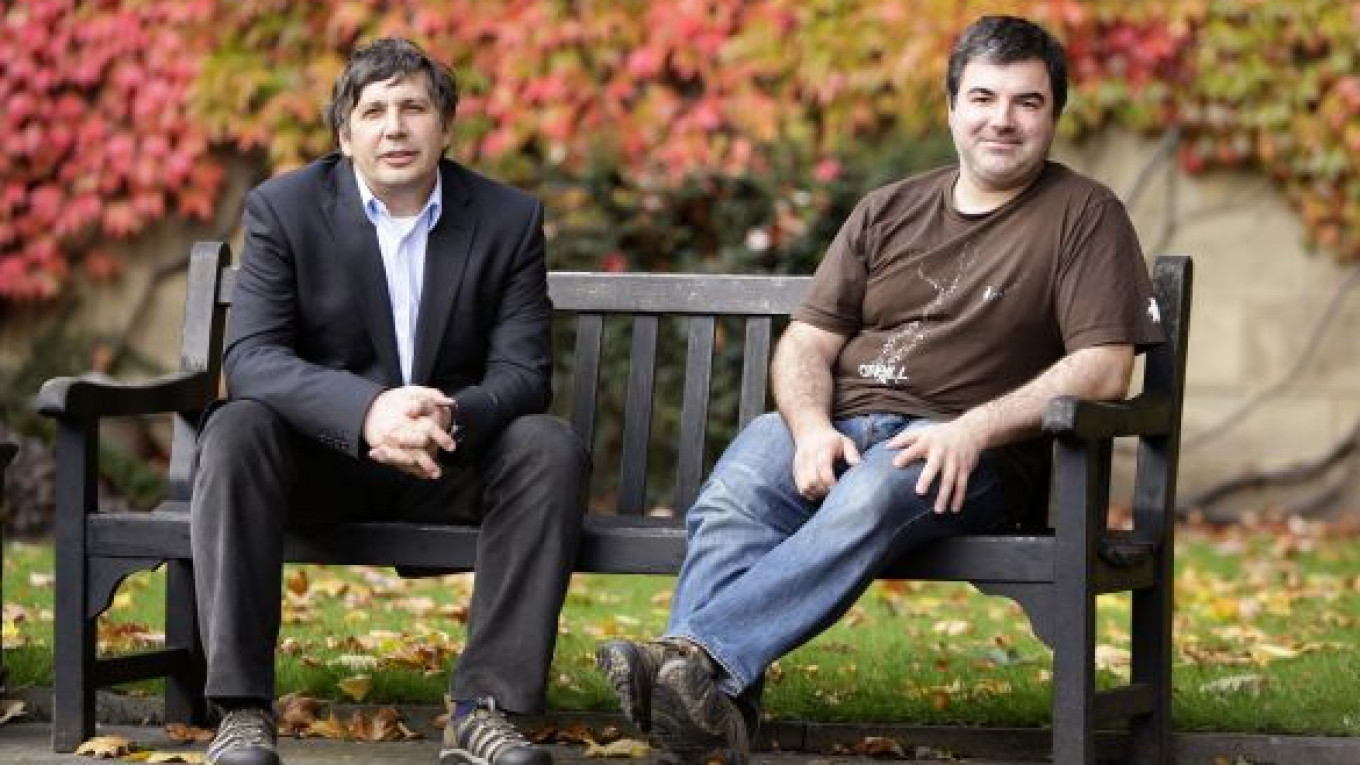LONDON — The Russian-born physicists who won this year’s Nobel Prize say their education in Moscow was among the best in the world, but they have no desire to return to the land of their birth or be involved in the Kremlin’s Skolkovo innovation center.
The physicists, Andre Geim and Konstantin Novoselov, said the Kremlin could throw money at science, but research would still be stymied by corruption, red tape and a lack of the vital international teams and facilities needed to engage in groundbreaking work.
Asked whether he could envisage a scenario in which he would go back to Russia, Geim spared no words. “Reincarnation,” he said.
Geim, 51, and Novoselov, 37, are the breed of scientists that the Kremlin needs to kick-start the development of Russian science with Skolkovo, the state-owned nanotechnology corporation Rusnano and other projects. But the two physicists, in separate telephone interviews, highlighted the towering hurdles that the Kremlin faces in its efforts by describing their own reservations about working in Russia.
The Nobel Prize in physics, valued at $1.5 million, was awarded by the Royal Swedish Academy of Sciences on Oct. 4 for Geim and Novoselov’s cutting-edge research on the new, two-dimensional material graphene in a British lab.
Only six years after their 2004 breakthrough, the award arrived much more quickly than is usual for Nobel Prizes. Geim recalled jokes about his possible candidature at a conference in 2004, but Novoselov, the youngest Nobel laureate since 1973, said the thought had not crossed his mind until speculation began three years ago.
While they recognized many contributions from different people to their work on graphene, both Geim and Novoselov only thinly disguised their contempt at the mention of Viktor Petrik, a self-styled inventor with ties to United Russia. Petrik, 65, claimed after the announcement of this year’s physics laureates that he had been the first to describe a method of producing graphene.
“Every country has its clowns and philistines,” Geim said. “The less they do, the more they advertise.”
Novoselov was more blunt. “Many people contributed to the inventing of graphene. He is not one of them,” he said.
Geim, a Dutch national, was born in Sochi and educated at the Moscow Institute of Physics and Technology. Novoselov, who holds British and Russian citizenship, was born in Nizhny Tagil, in the Sverdlovsk region, and was also educated in Moscow before moving to join Geim as a research student at the University of Nijmegen in the Netherlands. When Geim moved to Manchester, Britain, in 2001 to become a professor of physics, Novoselov followed him.
Novoselov described the education he had received in the Soviet Union as “one of the best in the world,” but both physicists said they moved away from the land of their birth for professional reasons. Happy with their well-oiled research laboratory in Britain, neither has any desire to return.
Russia has “neither the facilities nor the conditions,” Geim said, adding that there was an unacceptable “level of bureaucracy, corruption and idiocracy.”
Novoselov questioned whether a scientist could find truly international research teams working in Russia. “I wouldn’t be able to attract the best students and scientists [in Russia],” he said.
Even the lure of Russia’s version of Silicon Valley at Skolkovo holds few temptations for either scientist.
Novoselov doubted that it could accommodate his preferred style of work in a “small dynamic lab.”
Geim, who has already publicly refused an invitation to work there, was reluctant to castigate any investment in scientific research but was not confident of Skolkovo’s success. He bastardized a quote by Mayakovsky, the futurist poet who killed himself in 1930, on the subject: “I know that Skolkovo will be / I know that the garden will blossom / When such Nobel Prize winners / Are in our Soviet country!”
Geim also said former Prime Minister Viktor Chernomyrdin’s famous remark springs to mind when he thinks of Skolkovo: “We tried our best, but it turned out as usual.”
Neither man likes to label himself a Russian or, indeed, a British scientist. Novoselov is particularly vehement that such national labels have no meaning. In the Manchester laboratory where he works there are 12 people, all from different countries. Modern science is “so international” that it makes no sense to talk about nationalities, he said.
Geim, who has German parents, is more conciliatory, allowing that he could be called a “European scientist.”
“Every nation now claims me,” he said, “and they have a right to do so.”
Both men cited their flexibility and willingness to experiment as the most important factors in their scientific accomplishments. “Only successes are recorded in history,” Geim said, emphasizing that there were also many failures on a “scattered and diffusive trajectory” toward the discovery of graphene.
A single sheet of carbon, one atom thick, graphene is very strong, very light and a good conductor of heat and electricity. It has a huge number of possible applications, with the award citation mentioning its potential role in the development of touch screens, solar cells, bendable electronics, gas sensors and DNA sequencing.
Some scientists have predicted that the unusual properties of graphene at a molecular level eventually mean that it could be used in ultra-fast transistors, replacing the current material of choice, silicon.
Novoselov stressed that it had not all been smooth sailing. “[We] tried to invent some crazy ideas,” he said. The isolation of graphene required, in the end, “a bit of curiosity, a bit of luck.”
Geim previously received attention for using magnetic fields to levitate a live frog, a feat for which he received the prestigious spoof-science IgNobel Prize in 2000. This playful ingenuity was replicated in graphene’s discovery: The initial breakthrough was made using nothing more sophisticated than Scotch tape to strip layers off a block of graphite.
Novoselov, often perfunctory in his answers, appeared not to be enjoying his new public profile. Although he has used media interest to speak out against potential science funding cuts by the British government and criticize changes in Britain’s visa regime, he said he hopes that all the attention will die out as soon as possible. Receiving the Nobel Prize had been “life-changing,” Novoselov said, “but not necessarily in a good way.”
Geim said the experience has been a “nightmare.”
“Congratulations are fun, but not thousands,” he said.
He said he understood that after his win “every institution wants somehow to use me as an effigy on a pole in front of the government.”
“I will give it a year,” he said, and “see if I’m any good at it.”
A Message from The Moscow Times:
Dear readers,
We are facing unprecedented challenges. Russia's Prosecutor General's Office has designated The Moscow Times as an "undesirable" organization, criminalizing our work and putting our staff at risk of prosecution. This follows our earlier unjust labeling as a "foreign agent."
These actions are direct attempts to silence independent journalism in Russia. The authorities claim our work "discredits the decisions of the Russian leadership." We see things differently: we strive to provide accurate, unbiased reporting on Russia.
We, the journalists of The Moscow Times, refuse to be silenced. But to continue our work, we need your help.
Your support, no matter how small, makes a world of difference. If you can, please support us monthly starting from just $2. It's quick to set up, and every contribution makes a significant impact.
By supporting The Moscow Times, you're defending open, independent journalism in the face of repression. Thank you for standing with us.
Remind me later.







